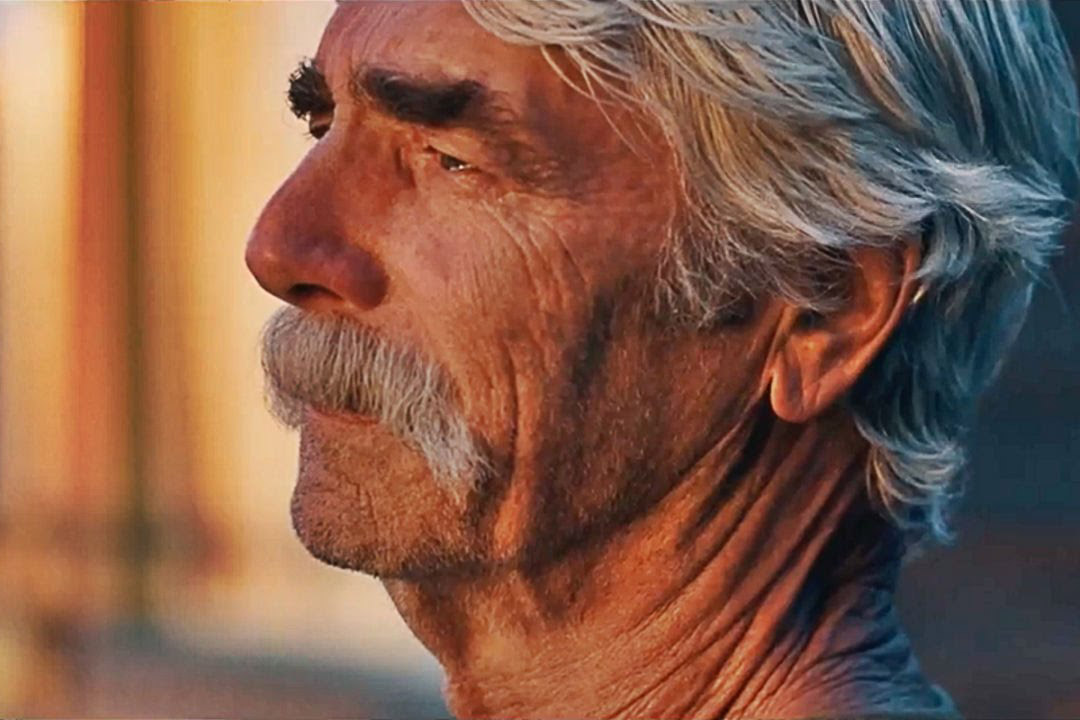You know the voice: a burbling purple baritone hung like a bass note plucked by the hand of God, a testosterone lullaby, a heavenly man-purr, canyon-deep in its middle passages and twisted at the bookends by a lispy twang that lops off syllables like a hot knife separating warm dough, altogether an emblem of life, liberty and pastoral beauty, like an echo resounding from the unconquered American West, at once primordial and ruggedly civilized.
And if you know the voice, you know the man: Sam Elliott, latterly of The Big Lebowski, where his iconic cameo as the bowling-alley guru with “the whole cowboy thing going” granted him a slacker slice of recent cinematic history (“I like your style, Dude”). There isn’t a dude in the world who couldn’t use a few sage words of advice from The Stranger.
For my money, however, it was Elliott’s turn as Lily Tomlin’s ex in Grandma (2015) that really nudged him forth as one of Hollywood’s most underrated character actors; it’s an edgy, savage and ultimately heartbreaking performance, and it elevates the film into near-greatness.
In a sense, the depths revealed by Elliott in Grandma set the stage for The Hero, a film that is completely his. And he owns it.
Co-written and directed by Brett Haley, The Hero fits rather neatly into a genre of film that we can call, cautiously, “the swan song,” in that it gives an aging actor in the twilight of his or her career a chance to shine in a particularly bright and focused spotlight. On Golden Pond, starring Peter Fonda and Katherine Hepburn, is one of Hollywood’s more notable swan songs, as is the performance of the late, great Peter O’Toole in 2006’s Venus (and it is to the Academy’s eternal shame that O’Toole was passed over, one final time, for the best acting Oscar that year).
On its surface, The Hero is so orthodox in its treatment of the late-life crisis-and-renewal theme that it verges on cliché: Elliott plays Lee Hayden, a 70-year-old actor whose one great film, a Western, is 40 years in the past (Elliott’s first movie role, by the way, was as a card player in Butch Cassidy and the Sundance Kid in 1969). Now Lee does commercial voice-overs for Lone Star barbecue sauce (a great inside joke that lends the film a pleasant winky quality).
Yes, Lee is adrift. Lee smokes too much pot. Lee is alienated from his daughter Lucy (Krysten Ritter), and his ex-wife merely tolerates him (Katherine Ross, Elliott’s real-life wife). Lee’s best friend is his drug dealer (Nick Offerman). Lee gets diagnosed with terminal cancer. He starts dating a woman half his age, an L.A.-hip stand-up comedian named, of course, Charlotte (Laura Prepon).
Although well-written and interestingly directed in places, The Hero never delves all that deeply (or even, at times, convincingly) into any of these relationships which, admittedly, are pretty hackneyed to begin with; instead, the film hones in tight on Elliott, and in that it gains considerable gravity despite a thin and fairly worn premise.
Of course, I would be more than happy to watch, and listen to, an entire film of Sam Elliott making voice-overs for barbecue sause, so any criticism I might level at The Hero falls to the wayside here. In fact, this film works entirely when viewed as a sort of prose-poem to Elliott, who stands at the center of it like an aging anti-hero in a moment of mortal reckoning — sad but not yet tragic, broken but unbowed, dying but yearning for life, alienated but slouching toward reconnection.
The light in Elliott’s eyes belies the leathery topography of his handsome face, and his performance here is painfully, joyfully humane, shot through with subtlety and an authenticity of emotion that is as captivating as the voice that defines his surface celebrity. In The Hero, Elliott proves himself more than capable of carrying a movie, and here’s to many more. The dude’s got style. (Broadway Metro)
